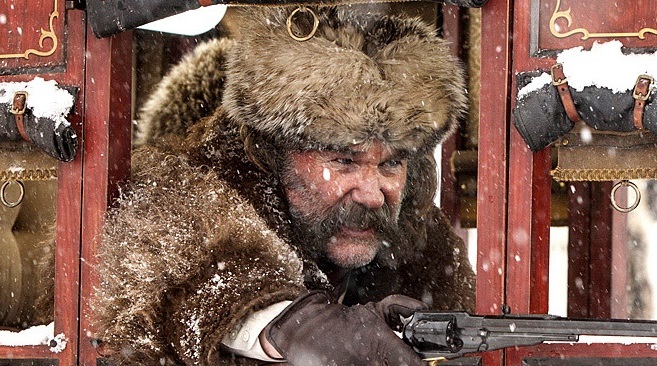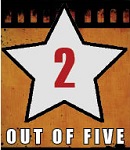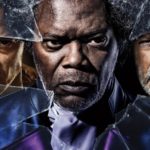

The Hateful Eight is pure, unfiltered Quentin Tarantino. For better and worse, this is the auteur in full view with absolutely nothing holding him back as he indulges nearly every whim and displays it in the widest format possible for all the world to see. If you hate the man and his work, you'll find an entire armory's worth of ammunition to fire back at him. If you love his work, you'll at the very least find some of the best stuff his career has ever offered.
However, if you're like me, you may well end up being frustrated by and conflicted about the whole ordeal.
The Hateful Eight is, like nearly every Tarantino joint, a pastiche of all the stuff the writer/director loves. In this case it's Agatha Christie, spaghetti westerns and John Carpenter's snowbound horror masterpiece, The Thing. A group of (mostly) strangers is trapped in Minnie's Haberdashery, a Wyoming roadhouse just outside the town of Red Rock, thanks to an unrelenting blizzard. John Ruth (Kurt Russell, sporting facial hair that defies description) is hauling Daisy Domergue (Jennifer Jason Leigh) to be hanged for the crime of murder. Maj. Marquis Warren (Samuel L. Jackson) is en route to claiming some bounties as well. Chris Mannix (Walton Goggins) is Red Rock's sheriff-to-be, while Oswaldo Mobray (Tim Roth) is the hangman hired to dangle Ms. Domergue in that same town. Gen. Sandy Smithers (Bruce Dern) is in the area to find out the final fate of his beloved son, but ends up face-to-face with Maj. Warren against whom he fought in the Battle of Baton Rouge. The taciturn Joe Gage (Michael Madsen) is just trying to get home to visit his dear, sweet mama for Christmas, all while Mexican Bob (Demian Bechir) has been put in charge of Minnie's Haberdashery while its eponymous owner is away on personal business. And as is befitting any film inspired by Carpenter and Christie, (most) of these characters aren't exactly who they claim to be and their numbers dwindle as the truth slowly gurgles its way to the surface.
The Hateful Eight has everything one would expect out of a Tarantino film: dialogue that crackles, memorable characters that live and breathe in a way that can truly only be brought to life in a way that QT and his actors can accomplish, unique needle drops on the soundtrack, and a level of violence that must be seen to be believed. But there's a certain strain of nastiness that has slithered its way through this film that puts it in a place that feels separate from the director's other works, a sadistic quality that makes it difficult to form an attachment to anyone or anything contained within.
The man has always delighted in daring his audience to follow along with characters who mitigate their unsavory nature and tendencies by displaying an electric charisma and personality. Jules Winfield may have been an unflinching hitman, but he knew how to deliver a knockout rendition of Ezekial 25:17 and even had a life-altering change of heart. Col. Hans Landa took pride in his ability to efficiently and ruthlessly track down Jews, but so charismatic was his process and countenance that you couldn't help but be riveted by his every word and gesture. When it comes down to it, no one in The Hateful Eight is any more wicked or unsavory than any of the characters in any of the seven films that preceded it. And yet, I find a Nazi colonel to be a much more compelling and interesting character than the majority of the murder's row that populates this film. Hans Landa was ruthless and evil, and yet I found myself flinching far harder every time John Ruth laid hand or fist (or often both) on Daisy, an actual gang member and killer.
Does that make it a bad film or an bad experience? Not necessarily. Merely a confounding one.
It can be said without reservation that, regardless of whatever wholesale issues linger within, the performances are uniformly superb and are reason enough to watch the film. Jackson delivers the kind of nuanced acting we often forget he's capable of. Leigh is downright feral and gives a performance that is unlike anything I've ever seen from her before. But it's Goggins' work here that truly stands a head above the rest. Chris Mannix is a character who should only inspire disdain from modern audiences given his postwar loyalties, and yet Goggins manages to wring a fair amount of Southern-fried charisma out of this somewhat hapless, would-be lawman. It delights me to no end that Goggins and Tarantino have found each other, and I can only hope the two forge a long-lasting working relationship.
It must also be noted how tremendously the film is paced. The "standard" version (the one not showing in 70mm, which adds a good 10 minutes thanks to an overture and intermission, as well as some extended scenes) runs just shy of three hours, and yet I never once felt it drag or crawl. It's a riveting experience in the moment as these exceptionally well-defined personalities clash and clang against each other in this pressure cooker of a roadhouse.
Only as the credits began to roll did the feeling slowly sink in that this is perhaps Tarantino's most empty production, a film which flirts with heavy, socially relevant topics that beg to be dissected and discussed within the context of art like this but ultimately has very little to say beyond some well-stated initial observations. In particular, it feels like Tarantino is going to tackle head-on the racism that continues to fester within American culture, the mindset and perspective that never really went away and continued to bubble just below the surface until it all finally began to boil over into plain view within the last year or two. Likewise it seems that he also has within his sights the modern justice system and the ways in which the mindset and actions of a few can often overpower the true meaning and purpose of said system.
And yet as the bodies lay piled, rivers of blood coagulating on the floor, we're left with … nothing. Granted, Tarantino has never been a "message" filmmaker. His body of work does not exist to provide some grand epiphany about the world in which we live or even the way in which we choose to live. But even Django Unchained and Inglourious Basterds functioned as a sort of catharsis or even long-held wish fulfillment. If there was anything approaching the power and impact of, say, the image of Shoshanna's cinematic ghost cackling as a movie theater full of Nazis burned then the whole of The Hateful Eight might've carried more thematic weight. But despite fertile ground practically begging to be further explored and dissected within this environment, Tarantino ultimately does nothing of note with the material with which he flirts.
What's Tarantino's point here? That in The Year 2015 racism still exists and that white people feel more secure by clinging to their guns and prejudices? You mean to say that Frontier Justice still gets served, even by those supposedly in the role of protector? While all of those things are undeniably true, I don't need a hyper-violent three-hour movie to tell me that. It's possible his entire mission was simply to hold up a brutally honest mirror to modern society, and if so mission accomplished but it often feels little more than lip service.
Upon exiting the theater, my immediate reaction was that this is likely the Tarantino Film I will revisit the least, although a part of me is compelled to do just that because I'm desperate to fully understand what exactly he was going for beyond the violence and stylization. But, in the meantime … is this his worst film? That feels like far too definitive a label to slap onto a work that offers so much to admire and enjoy. It is, more appropriately, his most indulgent film, while also the one that may well be his most polarizing.











